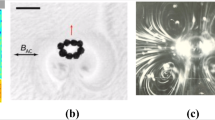Abstract
Complex fluids are characterized with both solid and fluid properties by their elasticity and viscosity, or rheological behaviour. The flow of complex fluids is a focus of interest in a very wide range of applications in biophysics and soft matter, such as problems involving live cells, processing of plastic, glass, paints, foods, oil recovery and so on. Recently, microrheology has been developed as an accurate technique to obtain rheological properties in soft matter from the microscopic motion of colloidal tracers used as probes, either freely diffusing in the host medium (passive), or subjected to external forces (active). A drawback for the models that simulate these techniques is their high computational cost. Therefore, the use of high performance computing is mandatory to develop the microrheology models. In this work, a microrheology model based on simulations of a tracer in a bath of Brownian quasi-hard spheres is proposed and parallelized. The analysis of the results of the evaluation using different sizes of the problem shows that GPU programming is very appropriate to accelerate these kinds of models.



Similar content being viewed by others
References
Bolintineanu DS, Grest GS, Lechman JB, Pierce F, Plimpton SJ, Schunk PR (2014) Particle dynamics modeling methods for colloid suspensions. Comput Part Mech 1(3):321–356
Brodtkorb AR, Hagen TR, Sætra ML (2013) Graphics processing unit (GPU) programming strategies and trends in GPU computing. J Parallel Distrib Comput 73(1):4–13
Cicuta P, Donald A (2007) Microrheology: a review of the method and applications. Soft Matter 3:1449–1455
Dhont J (1996) An introduction to dynamics of colloids. Studies in interface science. Elsevier, Amsterdam
Gazuz I, Puertas AM, Voigtmann T, Fuchs M (2009) Active and nonlinear microrheology in dense colloidal suspensions. Phys Rev Lett 102(24):248,302
Gnann MV, Gazuz I, Puertas AM, Fuchs M, Voigtmann T (2011) Schematic models for active nonlinear microrheology. Soft Matter 7(4):1390–1396
Hasimoto H (1959) On the periodic fundamental solutions of the Stokes equations and their application to viscous flow past a cubic array of spheres. J Fluid Mech 5:317–328
Hennessy JL, Patterson DA (2011) Computer architecture: a quantitative approach. Morgan Kaufmann, San Francisco
Kopp M, Höfling F (2012) GPU-accelerated simulation of colloidal suspensions with direct hydrodynamic interactions. EPJ ST 210(1):101–117
NVIDIA: Nvidia’s next generation CUDA compute architecture: Fermi (2012). https://www.nvidia.com/content/PDF/fermi_white_papers/NVIDIA_Fermi_Compute_Architecture_Whitepaper.pdf
NVIDIA: Nvidia’s next generation CUDA compute architecture: Kepler gk110 (2012). https://www.nvidia.com/content/PDF/kepler/NVIDIA-Kepler-GK110-Architecture-Whitepaper.pdf
NVIDIA Corporation: CUDA C PROGRAMMING GUIDE PG-02829-001_v7.5 (2015)
Ortega G, Vázquez F, García I, Garzón EM (2014) FastSpMM: an efficient library for sparse matrix matrix product on GPUs. Comput J 57(7):968–979
Paul W, Yoon DY (1995) Stochastic phase space dynamics with constraints for molecular systems. Phys Rev E 52:2076–2083
Puertas AM, Voigtmann T (2014) Microrheology of colloidal systems. J Phys Condens Matter 26(24):243,101
Schroer CFE, Heuer A (2015) Understanding the nonlinear dynamics of driven particles in supercooled liquids in terms of an effective temperature. J Chem Phys 143(22):224501
Sololovskii R, Thachuk M, Patey G (2006) Tracer diffusion in hard sphere fluids: from molecular to hydrodynamic regimes. J Chem Phys 125:204,502
Waigh TA (2016) Advances in the microrheology of complex fluids. Rep Prog Phys 79(7):074,601
Winter D, Horbach J (2013) Non-linear active micro-rheology in a glass-forming soft-sphere mixture. J Chem Phys 138:12A512
Winter D, Horbach J, Virnau P, Binder K (2012) Active nonlinear microrheology in a glass-forming yukawa fluid. Phys Rev Lett 108:028,303
Author information
Authors and Affiliations
Corresponding author
Additional information
This work has been supported by the Spanish Science and Technology Commission (CICYT) under contracts TIN2013-46957-C2-2-P, TIN2015-66680, FIS2015-69022-P and CAPAP-H5 network TIN2014-53522; Junta de Andalucia under contracts P11-TIC7176 and P12-TIC-301 in part financed by the European Regional Development Fund (ERDF) and the European HiPEAC Network of Excellence.
Rights and permissions
About this article
Cite this article
Ortega, G., Puertas, A.M. & Garzón, E.M. Accelerating the problem of microrheology in colloidal systems on a GPU. J Supercomput 73, 370–383 (2017). https://doi.org/10.1007/s11227-016-1867-8
Published:
Issue Date:
DOI: https://doi.org/10.1007/s11227-016-1867-8




